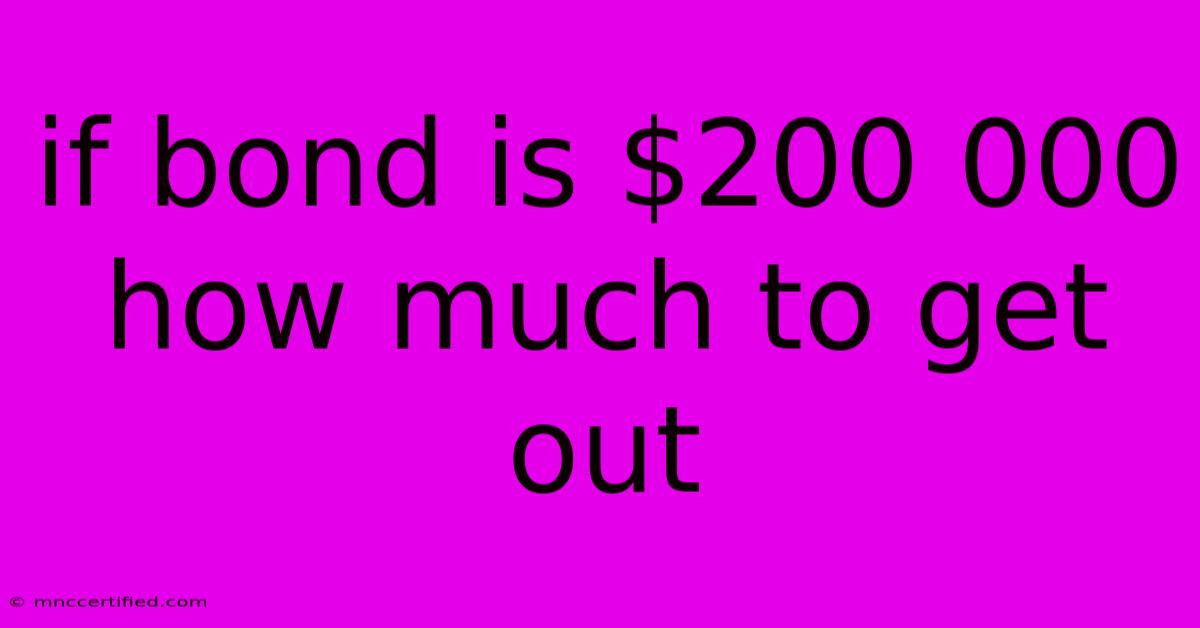If Bond Is $200 000 How Much To Get Out

Table of Contents
How Much Can You Get Out of a $200,000 Bond?
If you're facing a criminal charge, you're likely dealing with a bail bond. A bail bond is a financial guarantee that ensures you appear in court for your hearing. This means putting up a certain amount of money, known as the bond amount, to secure your release from jail. But how much can you actually get out of a $200,000 bond?
The short answer is: it depends. There are several factors that influence how much you'll get back after your case is resolved. Here's a breakdown:
Factors Affecting Your Bond Refund
1. Bond Type:
- Cash Bond: This is the simplest type, where you pay the entire $200,000 in cash to the court. You'll receive a full refund if you appear in court as scheduled.
- Surety Bond: This is more common and involves working with a bail bondsman. You'll pay them a non-refundable premium, typically 10% of the bond amount (in this case, $20,000), for their services. They post the full $200,000 bond, and you'll receive the remaining 90% back minus any fees after your case is resolved.
- Property Bond: If you own valuable property, you can use it as collateral for the bond. The court will assess the property's value and determine if it's sufficient to cover the bond amount. You'll receive your property back after your case is resolved, assuming you met all the conditions of the bond.
2. Court Fees:
- Depending on the jurisdiction, there might be additional court fees associated with the bond. These fees can vary and may be deducted from your refund.
3. Missed Court Dates or Violations:
- If you fail to appear in court or violate the terms of your release, you may forfeit the entire bond amount. This means you'll lose the money you paid or the property you used as collateral.
4. Case Outcome:
- If you are found guilty and sentenced to jail time, you won't receive any refund. However, if you are found not guilty or the charges are dropped, you'll usually receive a refund of the bond amount, minus any fees or penalties.
Example Scenarios
Let's illustrate how this works with some example scenarios:
- Scenario 1: Cash Bond: You pay $200,000 in cash and appear in court as scheduled. You are found not guilty. You will receive a full refund of $200,000, minus any court fees.
- Scenario 2: Surety Bond: You pay a $20,000 premium to a bail bondsman. You appear in court as scheduled and are found not guilty. You will receive a refund of $180,000 (the remaining 90% of the bond amount) minus any fees or penalties.
- Scenario 3: Property Bond: You use your house as collateral for the bond. You appear in court but are found guilty and sentenced to jail time. You forfeit the property, and the court sells it to cover the bond amount.
The Bottom Line
Getting a bond refund is contingent on various factors, including the type of bond, court fees, your compliance with the terms of the bond, and the outcome of your case. It's crucial to understand the terms and conditions of the bond before agreeing to it. If you're facing a criminal charge, consult with an attorney to discuss your options and understand the financial implications of posting bail.

Thank you for visiting our website wich cover about If Bond Is $200 000 How Much To Get Out. We hope the information provided has been useful to you. Feel free to contact us if you have any questions or need further assistance. See you next time and dont miss to bookmark.
Featured Posts
-
Gator Insurance Service Pinellas Park Fl
Nov 08, 2024
-
Gerardi Insurance Services Inc Putnam Ct
Nov 08, 2024
-
Chelseas 8 0 Win Over Fc Noah Highlights Their Strength
Nov 08, 2024
-
Harry Potter Trading Card Game Card List
Nov 08, 2024
-
Starbucks Holiday Drinks And Food Now Available
Nov 08, 2024